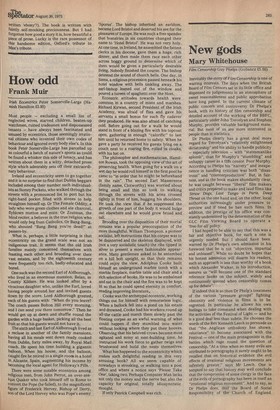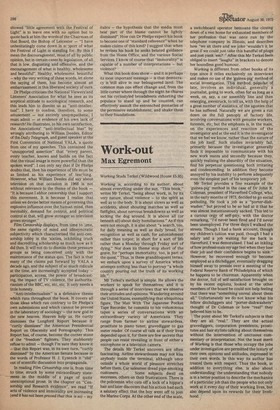New gods
Mary Whitehouse
Film Censorship Guy Phelps (Gollancz E5.50) Inevitably the story of Film Censorship is one of
warring interests. The days when the British Board of Film Censors sat in its little office and dispensed its judgements in an atmosphere of sweet reasonableness and public approbation have long passed. In the current climate of public concern and controversy Dr Phelps's book, with its history of film censorship and detailed account of the working of the BBFC, particularly under John Trevelyan and Stephen Murphy, provides valuable background material. But most of us_ are more interested in people than in statistics.
Dr Phelps clearly has a great deal more regard for Trevelyan's "relatively enlightened dictatorship" and his ability to handle publicity — especially television — with "statesmanlike aplomb", than for Murphy's "stumbling" and unhappy career as a fan censor. Poor Murphy.
According to Phelps his "naivety" and inexperience in handling criticism was both "disas trous" and "counterproductive". But, in fair ness, and as the book makes abundantly clear, he was caught between "liberal" film makers
and critics prepared to make and laud films like Straw Dogs, Last Tango in Paris, Deep Throat on the one hand and, on the other, local authorities increasingly under pressure to preview and if need be ban such films. In addition, the prestige of his office was constantly undermined by the determination of the GLC Film Viewing Board to operate a 'free-for-all' policy.
I had hoped to be able to say that this was a fair and objective book, for such a one is urgently needed. But I should have been warned by Dr Phelps's own admission in his foreword that he is not "objective, impartial and unbiased". While no doubt he hopes that his honest admission will disarm his readers, such an approach is less than worthy of a book which Alexander Walker, in his introduction, assures us "will become one of the standard reference books on the subject, widely and continuously quoted when censorship comes up for debate".
If indeed this is so then Dr Phelp's treatment of the various "pressure groups" fighting obscenity and violence in films is to be regretted. In particular he allows his own feelings to take command when dealing with the activities of the Festival of Light — and he is a good deal less than subtle. He chooses the words of the Rev Kenneth Leech to persuade us that "the Anglican orthodoxy has shown reluctance" to become associated with the Festival — one of the main protagonists in the battles which rage round the question of censorship. "At a time when so many evils are attributed to pornography it surely ought to be recalled that on historical evidence the evil effects of irrational religious movements are infinitely greater," says Mr Leech. One is tempted to say that history may well conclude that the compromise of some clergy in the face of the evils of pornography has been in itself an "irrational religious movement". And to say, as Dr Phelps does, that the Board of Social Responsibility of the Church of England showed "little agreement with the Festival of Light" is to leave one with no option but to quote back at him the words of the Chairman of that Board, the Bishop of Leicester — "I have unhesitatingly come down in sr ?port of what the Festival of Light is standing for. By this I mean the discouragement, most of all by public opinion, but in certain cases by legislation, of all that is low, disgusting and offensive, and the encouragement of what is healthy, wholesome and beautiful". Healthy, wholesome, beautiful — why the very writing of these words, let alone the saying of them, has become almost an embarrassment in this liberated society of ours.
Dr Phelps criticises the National Viewers'and Listeners' Association for what he sees as its sceptical attitude to sociological research, and this leads him to dismiss us as "anti-intellectual". I have to confess, therefore, to some amusement — not entirely unsympathetic, I must admit — at evidence of his own lack of research! He illustrates, to his own satisfaction, the Associations' "anti-intellectual bias" by wrongly attributing to William Deedes, Editor of the Daily Telegraph, and guest speaker at the First Convention of National VALA, a quote from one of my speeches. This contained the "unsupported assertion" that "every parent, every teacher, knows and builds on the fact that the visual image is more powerful than the spoken word". I can only say that if Dr Phelps doubts that, then his experience of life must be as limited as his experience of teaehing. However, what William Deedes did say about television on that occasion in 1966 is not without relevance to the theme of the book — "It is because I abhor censorship that I support this movement. It is because I realise that unless we devise better means of governing this explosive influence over the human mind, then inevitably, demand for control, and political control at that, will grow stronger as television grows stronger."
Film Censorship displays, from time to time, the same rigidity of mind and idiosyncratic subjectivity which characterised the anti-censorship lobby in the 'sixties, inhibiting truth and discrediting scholarship as much now as it did then. It will not do to dismiss these pressure groups as being concerned only with the maintenance of the status quo. The fact is that many of the claims put forward by VALA a decade ago, and the subject of so much ridicule at the time, are increasingly accepted today — participation, access, the power of broadcasting, the impact of TV violence, the authoritarianism of the BBC, etc, etc, etc. It only needs a little honesty.
"Anti-intellectualism" is a defensive theme which runs throughout the book. It covers all those ideas which run contrary to Dr Phelps's own submissions and which cannot be proved in the laboratory of sociology — the new god in the new heaven. Heaven help us. He curtly dismisses the Longford Report because it "curtly dismisses" the American Presidential Report on Obscenity and Pornography. This • Report has, of course, become the corner stone of the "freedom" fighters. They stubbornly refuse to admit — though I'm sure they know it — that this Report was, in its own turn, "curtly dismissed" by the American Senate because in the words of Professor H. J. Eysenck it "slid" out of scientific discussion into propaganda. In reading Film Censorship one is, from time to time, struck by some extraordinary state-ment---inthe middle of a page of quite unexceptional prose. In the chapter on "Censorship and Research evidence", we read "If acts of violence and immorality are increasing (and it has not been proved that this is so) — my italics — the hypothesis that the media must bear part of the blame cannot be lightly dismissed". How can Dr Phelps expect his book to become one of "standard reference" when he makes claims of this kind? I suggest that when he revises his book he seeks belated guidance from the Home Office, and the various Social Services. I know of course that "immorality" is capable of a number of interpretations — but violence?
What this book does show — and it is perhaps its most important message — is that democracy is 'still alive in our beleaguered land. The common man can effect change and, from the little corner where through the night he churns out his cyclostyled broadsheets exhorting the populace to stand up and be counted, can effectively assault the entrenched pinnacles of the permissive establishment, and shake them to their foundations.



































 Previous page
Previous page